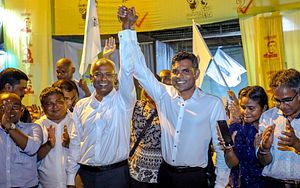The results of Maldives’ presidential elections on Sunday came as a total surprise to most observers in the Maldives and outside. The Election Commission announced the victory of Ibrahim Mohamed Solih of the Maldivian Democratic Party, who secured 38,484 more votes than the incumbent president, Abdulla Yameen.
The head of the Election Commission stated that there were no election irregularities or complaints that could affect the results. President Yameen conceded defeat on Monday, clearing the path for President-elect Solih. Solih is the joint candidate of the opposition parties: the election saw the coming together of three opposition political parties – the Maldivian Democratic Party, Jumhooree Party, and the religious Adhaalath Party. The president-elect, considered an old-timer in politics, belongs to the Maldivian Democratic Party whereas his deputy, Faisal Naseem, a new face, comes from the Jumhooree Party.
Many newspaper headlines have drawn quick and not-so-correct reading on the impact of the election results. There have been exceptions of course, which called for caution. Still, most of the accounts suggested rather simplistically that the defeat of Yameen is bad news for China and good for India.
In fact, while there may be some minor setbacks for China with the new leader, the reality is that Male cannot cut China lose because of Beijing’s economic capacity to deliver what Male needs. For all the goodwill that India may enjoy in Maldives, New Delhi lacks the material capacity to offset China. India’s track record in establishing infrastructure and regional connectivity networks has not been the best, to put it mildly.
But, certainly, the sizeable anti-India sentiment that prevailed during Yameen’s presidency will be gone. The new government will be forced to do a fine balancing act between India and China, and the Solih Government will have to balance economic and strategic interests.
Nevertheless, China’s foreign ministry in a press briefing responded to a question on Maldives saying that it “congratulates the Maldives on the smooth holding of the presidential election and Mr. Solih on his election as the President. We respect the choice made by the people in the Maldives and hope that the Maldives can maintain stability and development. China and the Maldives enjoy traditional friendship.”
Yamen was seen as particularly close to China and also had a bit of an anti-India streak. During Yameen’s time in office, the China-Maldives economic and investment relations grew at a fast pace, and his tenure also saw the conclusion of free trade agreement between the two. Also, in February there were reports that talked about China’s plans to set up a joint ocean observation station in Makunudhoo, the westernmost atoll, which raised alarm bells in India.
However, a day after the initial reaction from China, Beijing did not shy away from lashing out at opposition leaders in Male, especially Nasheed for apparently “questioning the commercial viability of Chinese projects in the Maldives lacking in transparency and democratic procedures.” In a strongly worded reaction, China’s foreign ministry said, “Whether the cooperation between China and the Maldives can work out or bring benefits to the two countries is all up to what the two countries’ people say. It cannot be smeared by certain individuals.” “We will oppose if certain people harm China’s interests,” it added rather ominously.
Sunday’s election results have the potential to effect some changes internally and externally. Internally, five political prisoners have been released so far and more may be released in the coming days and weeks. Externally, the changes could be significant. Earlier in the year, the former foreign minister Ahmed Naseem reflected on Yameen’s ruling style, suggesting that it “is not just about democracy, it is about peace, security, and stability in the entire Indian Ocean neighborhood.”
To be sure, the new government in Male will want to renegotiate the projects that China is engaged in because, as MDP leader Nasheed said, many believe that “China has pulled his country into a “debt trap” and that a future opposition-led government would renegotiate Chinese loans.”
The current domestic political crisis began with Yameen’s decision to disregard the Maldivian Supreme Court’s ruling in February this year, which called the Government’s imprisonment of opposition leaders a “violation of the constitution and international law.” The court also ordered the government to release the nine opposition leaders including Nasheed. In response, Yameen declared a state of emergency that extended for a period of 45 days, during which he also had two judges, hundreds of activists and opposition leaders including former President Maumoon Abdul Gayoom arrested. Yameen lifted the emergency after 45 days on March 22.
Many opposition leaders, including Nasheed, claimed that Yameen lifted the emergency because by then he had consolidated power, including over judiciary and parliament. Nasheed and many opposition leaders have been in exile since the beginning of the crisis and is now set to return to Male.
India, which has traditionally played an influential role in Maldives, has been perplexed by the recent developments in the run-up to the elections. New Delhi had supported the government of President Gayoom, to the point of squashing an attempted coup against him in 1988 by sending Indian troops. But under Yameen, the country was slipping out of India’s orbit, supporting China’s Belt and Road Initiative, and moving closer to China.
While there may be some cancellations and renegotiations of China-funded projects by the newly elected government, China’s influence in Male is unlikely to reduce significantly because there is simply no one else to replace China. Though India may not like it, it does not have the capacity. Moreover, India’s credibility has been hit because New Delhi was unable or unwilling to do anything concrete despite the repeated pleas from the opposition parties. India has a hard job ahead in overcoming these difficulties.

































